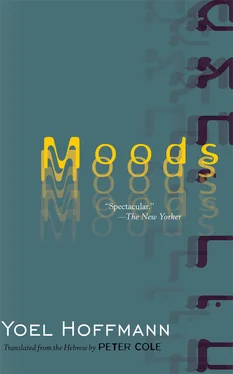Once we knew a woman who wanted a child very badly but miscarried every one she conceived. She sat in cafés and so on, like everyone, but every time — roughly once a year — when they asked her (and also when they didn’t), she’d say: The baby died.
Correct. The baby would have died in any case. He’d have died in a war or of old age. And so it’s possible to say such a thing about every baby. But that he died before she managed to see him. And that he died before he managed to see her. And that afterward she sat in cafés and had to say those words. All these things are harder even than war to bear.
[185]
We should seat Mr. Yellinek (and Yirmiyahu from the army) on the backs of wild geese, so they can fly far above the earth like Nils Holgersson.
We’ll have to say goodbye to them as they’re going beyond the borders of the book. Wild geese don’t comply with literary convention. But they’ll hover in other worlds and from a great height see the well-tended fields and the places where people live. They won’t be able to see people from that height, and so the journey will involve a certain amount of loneliness. But imagine that the heavens are one huge mailbox and letters arrive for Mr. Yellinek from distances that he can’t fathom.
We could end the book like that, but most of our characters are too heavy to put on the backs of wild geese. We ourselves (which is to say, I) would like to leave the book that way. And, if possible, the world — period. But some inexplicable stubbornness is compelling us to get at least to chapter 200 and, if possible (though this in fact is beyond our control), to our eightieth year.
[186]
We know some professors who are the exact opposite of wild geese.
First of all, they’re always quarreling and therefore they can’t take off and fly in those beautiful formations. Second, their colors. They’re never white. Usually they’re one shade or another of green or yellow. Third, their necks are short.
And there’s another difference. Wild geese leave no traces. If you say that they’re here, they’re there. If you say that they’re there, you’ve lost them. Professors, on the other hand, never move from their positions. Moreover, they draw everything to where they are. Soup. Various items. Gravitational fields, etcetera. Many are like a German housewife who’s always pickling cucumbers.
Though now we’ll risk being sued for libel, we’ll mention in particular Professor Har-Shoshanim (formerly Rosenberg). You’ll always find him opening doors or shutting them. He wears brown leather shoes and you’ll never catch him with both of his feet in the air. When he speaks what he says is all too clear and others, therefore (others, that is, in his proximity), need to take Prozac. Above all, he’s an associate professor and in the end will become (unlike the wild geese) a full professor.
[187]
Once Professor Har-Shoshanim proposed during a faculty meeting that two departments be merged and two others be split. His hands made a motion indicating a merger (when he spoke of merging) and another one suggesting a split (when he spoke of splitting).
It’s very hard to remember the reasoning that he laid out for the council. But we remember the gold frames of his glasses glinting in the neon light. Maybe his rivals were thinking (as in the stories by Karl May about the Indians and the eclipse) that the glinting indicated hidden powers. In any event, his proposal for the merger (and for the split) were approved by a large majority.
In the parking lot, next to his Mazda Lentis, Professor Har-Shoshanim took off his glasses and wiped the lenses. He stood there, alone, his head rising like a disk over the cars of the senior faculty.
There are moments in human history that have to be given a name. That moment will most likely be called “the moment when Har-Shoshanim took off his glasses” or “the moment when Har-Shoshanim looked toward the university but didn’t see it.”
[188]
Imagine the loneliness of writers surrounded by the characters from all their books and unable to get away from them and go back to their families.
There’s no consolation to be had from Har-Shoshanim. We tried going to his home and couldn’t. We tried to meet him in the cafeteria. Again, no luck.
With Mr. Yellinek we manage to get along, somehow. We can pay him our dues for the housing board (thirty shekels) and offer him a cup of tea. But then he goes silent. We need someone we can talk to, but can’t find anyone like that in the entire book (apart from the dead, of course).
The girls we had crushes on are already old (in the book as well) and if we had a friend or two we wouldn’t want to see them if they were older than seventy or so. What would we talk about. Arthritis?
Maybe it’s our problem. We’re anti-social, and so at best we live in peace with an imaginary notion of women.
[189]
But it isn’t right to trouble our readers with these sorts of things. If we’re not mistaken, we also promised (in the opening chapter) a love story.
If we’re afraid of close quarters we can find it (love, that is) in large train stations. Sit on a bench in the main concourse and think of the high ceiling as the dome of heaven and the people coming and going as creatures of God. Regina and Moshe and Shalom (with the suitcases). And Odelia. And Haim. And Mr. Schwartz, whose hair has gone white. And the entire Na’im family (with the elderly aunt). And Abramov. Who isn’t there?
You can go up to them as though you were the Pope in the great square and open your arms wide as though you were a fisher of men. And whoever comes into them comes into them. And deserves love.
And don’t be put off by the fear in people’s faces. And don’t worry about the policeman who might take you away. You can embrace him as well. And, above all, don’t lose that love when you’re with the psychiatrist they’ll quickly call in. It isn’t his fault. Just tell him: You too are worthy. You too.
[190]
We’d like to leave our readers with a great gift before they move on to other books. Perhaps a character. But we’re like a building contractor whose tools are limited. At most he puts up a wall or lays down a floor and says to the client that he should use his imagination to fill in the rest.
Assume for a moment that the criminal code applied to writers as well. We would be sued for negligence and the incompletion of characters just as suits are brought against contractors.
Your honor, we’d say, but we’ve given the reader the essential quality in each case. There is no such thing, the judge would reply, the reader’s entitled to all the particulars.
Once we knew a woman whom we could describe (on our own) down to the last of the thousands of hairs on her head. That’s how much care we took with her character. But if we were to do that now, our readers would sue us for excessive particularity.
So all we can offer our readers is this: a large mug with the words GOOD MORNING (in English) written across it. They can drink their morning coffee from it and picture a person in their mind’s eye.
[191]
In addition to the mug (as in a buy-one-get-one-free special) we could tell a beautiful tale:
In the beginning, when God was creating the heaven and the earth, the earth was formless and waste, and darkness was over the face of the deep, and a wind from God hovered over the face of the waters.
Imagine the loneliness of countless years. Like a giant, old autistic man, He stared into what was and saw not even a crack. And because of its tremendous proportions, not even an angle or a curve. And when He looked outside, on account of His great pain, He saw only something like a cloud or pale washes of color. How long could He remain like that, all alone?
Читать дальше












